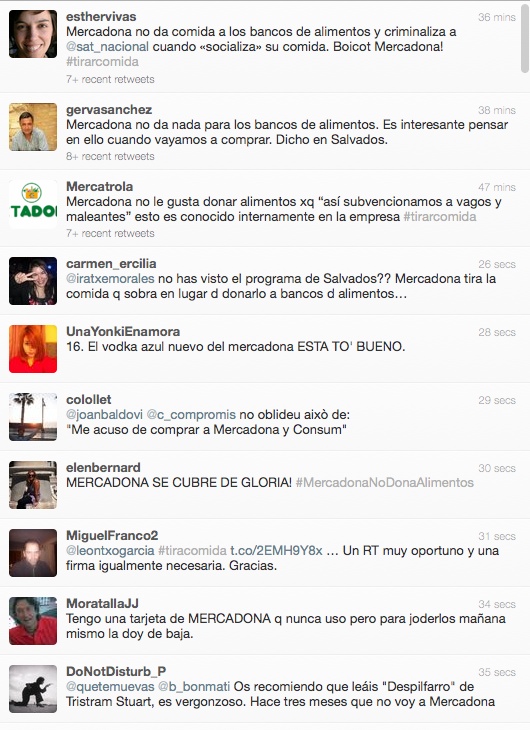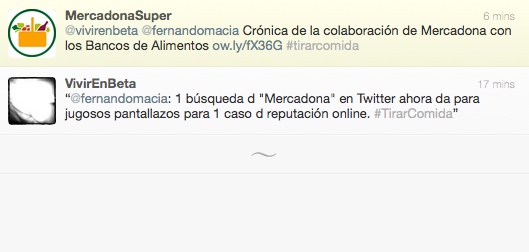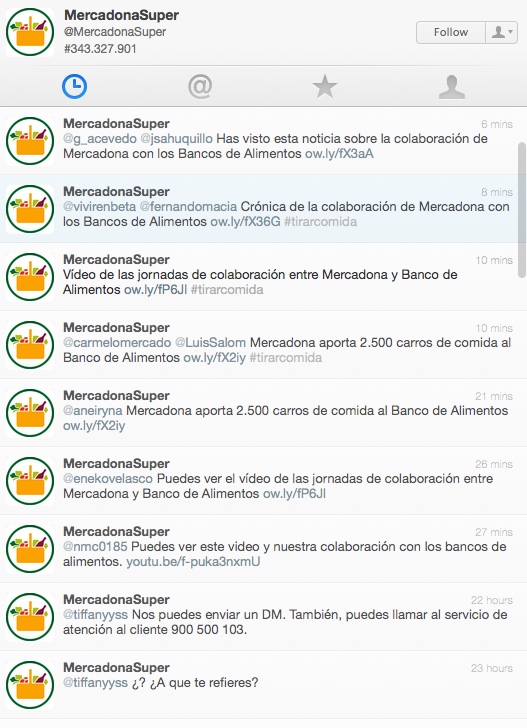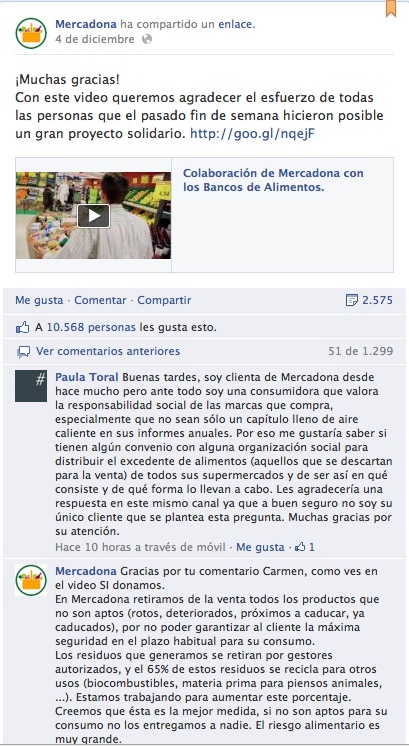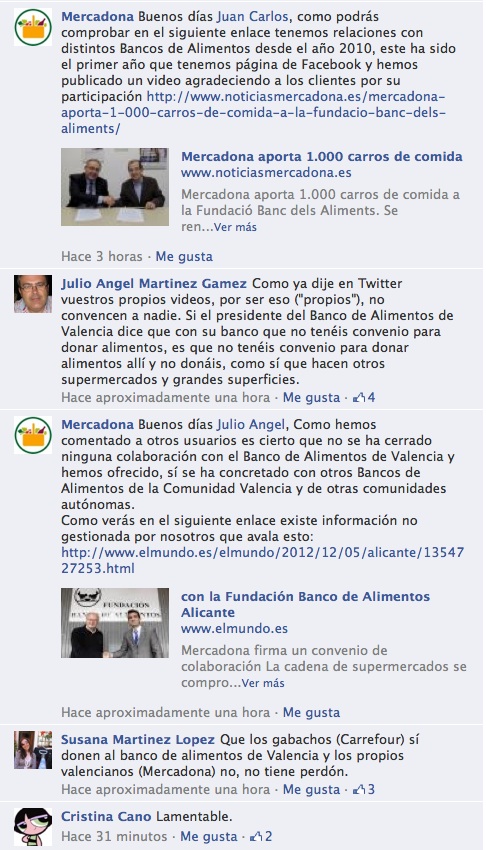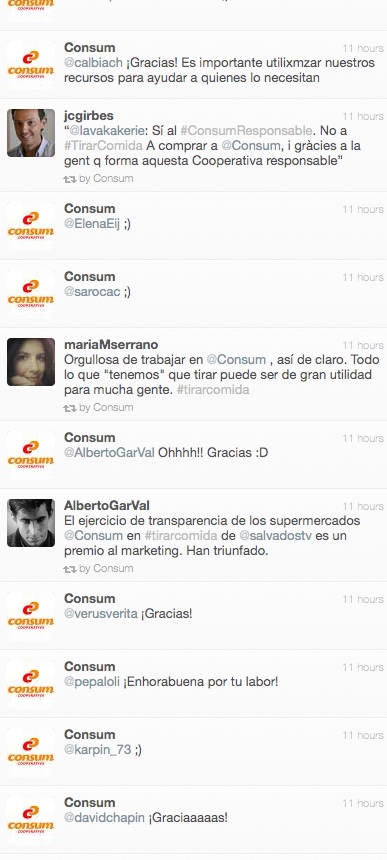Written by Fernando Maciá
Index
The spark for Mercadona was sparked on Sunday night on the program Salvados, presented by Jordi Évole, in which the popular Valencian food distributor was accused by the head of the food bank of Valencia of not collaborating by providing surplus products close to expiration or unsold or defective fresh food.
An online reputation crisis for a big company, for a big brand, is like a fire.
It starts with a spark and it depends on how you have acted before and how you act during the first stages of the fire whether it remains an outbreak or acquires catastrophic dimensions.
Mercadona on Salvados: the spark
The spark for the fire in which the food supermarket chain Mercadona is currently fighting, was sparked yesterday on the Spanish television program of the La Sexta channel, presented by Jordi Évolein which, under the title Food is not to be trifled with, analyzed various situations in which food is thrown away or wasted. A paradoxical situation in the current crisis scenario in which requests for help to Food Banks or the number of meals served by Caritas has more than tripled in recent times.
In addressing the problem of how retail chains manage the disposal of fresh foods The program cited a study by the Ministry of Agriculture and Food, which states that 78% of supermarkets withdraw products from sale because they are close to their expiration date. These products, which can hardly be sold in supermarkets but are still perfectly suitable for consumption, are managed differently by each distributor. In last night’s program, Salvados showed the different policies of two leading retail chains: Consum Supermarkets and Mercadona.
On behalf of Consum, Jordi Évole interviewed Carmen Picot, Institutional Relations, Consum SupermarketsThe majority of supermarkets of this brand have collaboration agreements with NGOs and local solidarity organizations that collect these surpluses on a daily basis to distribute them to people in need. With great elegance, Carmen Picot also gives all the credit to these entities of which she says that“they are the ones who do all the work“.
In stark contrast to Supermercados Consum, we can see in the beginning of segment six of the program, how Jaume Serra, head of the Valencia food bank, explained that Mercadona does not contribute anything to the food bank.The program did not provide any other information in this regard, nor did the distributor provide any contrast in this regard.
It is often said that forest fires become devastating when the conditions of the three thirties are present: less than 30% humidity, more than thirty degrees Celsius of temperature and more than 30 kilometers per hour of wind, together with a state of lack of maintenance of the forest. These are the ideal conditions for a spark to trigger a catastrophe.
A few seconds after the mention of Mercadona on Salvados, the spark ignited on Twitter:
But for a spark to ignite, as we said, certain favorable conditions are necessary.
In my opinion, the favorable conditions for Mercadona’s online corporate reputation crisis have their origin in:
- Drastic reduction in the offer of products of other brands: Mercadona started a few years ago a policy to reduce the number of products offered in its stores, which caused thousands of loyal Mercadona customers -including myself- to change supermarkets. Mercadona’s shift towards hard discount caused many customers to decide to change supermarkets to others in the higher segment, or, once the differential advantage with Lidl or Día was eliminated, to opt for these other leading price options.
- Juan Roig’s recent unfortunate interventions: In a scenario where thousands of honest, honest, hard-working and educated people are losing their jobs, the president of this supermarket chain with record profits in March of this year with a profit of statements in which he stated that it was necessary to practice the culture of effort and work as the Orientals do in their bazaars. And it was not the only one, in June he once again empathized with his potential clientele by warning that“either the Spaniards get their act together or we will be intervened“. In circumstances in which Mercadona has decided to go for the price fight (confronting supermarkets such as Lidl or Día and abandoning its traditional premium segment), this type of statement is not exactly in tune with the clientele that the chain is targeting. In this sense, it strikes me that business leaders such as Michael O’Leary (Ryanair), or Juan Roig in this case, can publicly intervene to annoy and irritate precisely their target market segment.
- No investment in advertising: Let’s not fool ourselves, not investing anything in advertising is doing very little to get the media on your side. It is possible that other supermarkets and food distributors do not donate surpluses to NGOs and the program could have mentioned them, but between “touching the noses” of El Corte Inglés, which invests heavily in advertising, and touching the noses of Mercadona, which does not, the choice is obvious.
- Very strict conditions for suppliers and workers: Although it is true that Mercadona creates stable employment and provides an outlet for the products of many manufacturers and agricultural cooperatives, it is also true that it takes advantage of its enormous financial muscle to impose minimum profit margins and demand absolute dedication from its employees.
- Recent problems that raised doubts about the quality of its own-brand products: such as the recent recall of Deliplus brand creams, after problems were detected with two of their components.
- Social profiles with little seniority: Mercadona’s history on both Facebook and Twitter is relatively very recent (there are no posts on Facebook prior to 2012 and the Twitter profile was created in 2011), so could not have had time to create a large community with a high level of engagement that now comes to his defense.
With these conditions, it seems that Mercadona as a brand has not done much to keep its forest in good condition. The conditions were optimal for the spark to ignite in the brand’s enemies, without the first and most effective defensive bulwark – the brand’s customers and ex-customers, its workers, its suppliers – feeling motivated to intervene to defend the supermarket chain.
The Community Manager: putting out the fire with gasoline
In these circumstances, and being the time that it was (Salvados is broadcasted from 9.30 pm on Sunday night), everything was pending on what the Community Manager did.
Of course, the only thing I could do was to start tweeting left and right, pointing to two or three news links -published on the news portal mercadona.es itself- showing that Mercadona does collaborate with Food Banks.
I believe that, in this case, the Community Manager either made a mistake or had no other cards to play: it does not play in favor of the credibility of a brand that responds to an online reputation crisis with news published on its own portal. and clearly dated after the television program was produced. It shows that such news was cooked ad hoc to be used in anticipation of the storm, since Jordi Évole, apparently, had contacted Mercadona so that the brand could anticipate the meaning of the report.
It does not play in favor of the credibility of a brand that responds to an online reputation crisis with news published on its own portal.
Thus, the timeline of @MercadonaSuper was a veritable poem of replies to profiles including links to their own sources:
The lack of a community that has come out in defense of the brand is evidenced by the lack of RT’s of tweets from users who could have spoken in its favor. And if this has not been done, it seems a big mistake on the part of Mercadona’s Community Manager.
Things have not looked any different at Facebook:
And the sense of Mercadona’s response, indicating that they do not donate food because it is not fit for consumption, has not been the best option, as it is clear that there are foods that are not sold daily that are no longer fit for sale even though they are fit for consumption. Neither is the refutation that they donate food to other banks. With Mercadona’s Valencian roots, it is not understandable that if they do it in other places, they do not do it in Valencia:
In contrast, the timeline of Supermercados Consum contrasts, thanking the many compliments received after the publication of the report and the clever use of RT to amplify the spread of positive messages. Very good work in my opinion:
Lack of prevention: what search engines are saying
As an SEO myself, I was also interested in knowing what is the
visibility
that Mercadona’s food donations, versus those of other establishments, had achieved in search engines. If any company participates in solidarity programs and does not sell it well, it means that the communication manager of that company is not doing a good job, in my opinion.
If any company participates in solidarity programs and does not sell it well, it means that the communication manager of that company is not doing a good job, in my opinion.
If Mercadona has really participated in solidarity food donation programs, it should have left avisible tracein search engines. I was curious to find in visible posts news about food donation from different supermarkets.
In order not to contaminate the results with ad hoc fabricated news once the Salvados report was known, I restricted the results to the dates January 1, 2000 to October 31, 2012. And these were the revealing results:
- “mercadona + donate food” in Google, from January 1, 2001 to October 31, 2012.
- “lidl + donate food” in Google, from January 1, 2001 to October 31, 2012.
- “consum + donate food” on Google, from January 1, 2001 to October 31, 2012.
If you have followed the links above you will see that the comparison is colorless. There is a multitude of positive news from Lidl and Consum and, more importantly, from independent sources, not published by the store itself.
Even if we look at their own sources -noticiasmercadona.es- there is the tag “Banco de Alimentos” under which only a sad news is cited (apparently, the speed to publish this most recent one has caused that this tag has not been added). So Mercadona’s Community Manager has not had much material to draw on to put out this fire.
Regardless of what each chain has actually donated, it is clear that someone at Mercadona has NOT done their job well. Mercadona’s Community Manager has been left alone in the face of thousands of criticisms with only three or four self-made notes. If Mercadona had invested in keeping the forest clean, it would have had numerous previous news stories to cite and a loyal community that would have come to its defense. But neither has happened.
Moral of the story: fires are extinguished in winter
An online reputation crisis is like a fire: no one wants it to happen, but when it does, its effects can be terrible. Regardless of what caused it, whether a spark turns into a fire often depends on how the forest was prepared during the winter. -This is, if the forest has been cleaned, preventive pruning, firebreaks, that is, if the forest has been properly maintained – and, once declared, the effect that the neighbors have on the forest, and their level of commitment to be the first to warn of the danger and participate in the extinguishing work. The more lush, rugged and extensive the forest, the greater the risk of fire, so it is the largest and most beautiful forests that should be given the most resources to preserve and protect.
Mercadona is a great brand. It is therefore long overdue to invest in creating a large community of loyal and like-minded customers, evangelists of the brand, who would have come out en masse in its defense yesterday and today. But this community is still being created and the other affected groups – workers, suppliers and customers – do not seem very keen to defend this brand.
On the other hand, Mercadona does not invest in advertising. This leaves it open to any criticism from the media and, finally, an earlier consultation leaves little evidence of real activity by Mercadona in favor of a more reasonable management of its surplus food. Either he has not done so, or he has communicated it very poorly. And in this case the wind of television has blown to spread the spark of the appointment of the president of the food bank of Valencia.
My congratulations to the CM of Mercadona because, given the circumstances, I sincerely believe that it could not be done better.
What do you think I could have done better?
